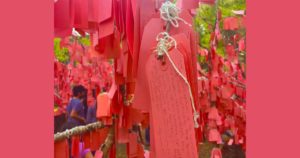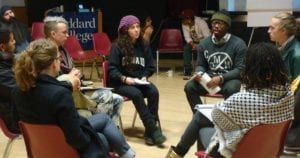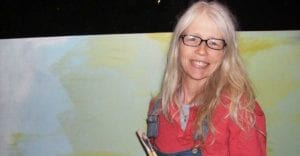
By Aimee Liu
“Fiction is the art form of human yearning.” – Robert Olen Butler
“We are living in the most fearmongering time in human history.” – Barry Glassner
“I think what we need to do is to remind people that the Earth is a very dangerous place these days. That ISIS is trying to do us harm. And that the president’s commitment is to keep the country safe.” – Sean Spicer
I know the fearmongering is manipulative BS. Just two years ago, The Atlantic reported that most of us were living through “the best year in history.” Household wealth, longevity, education are all on the rise, and, despite terrorism and war, violent crime and extreme poverty have been dropping globally since 1991. But none of this suits the political agenda of Donald Trump, who knows not only that fear buys power, but also how to sell anxiety without the slightest qualm about unintended consequences.
One of these consequences, for me at least, is a kind of creative paralysis. Knowing that the fear is “trumped” up – (which comes first, I wonder: the name, or the character of our Fearmonger-in-Chief?) – does little to quell its effect on my psyche. I’m in fight-or-flight mode all the time, feeling angry and helpless and mostly speechless in the face of the lies that service this culture of fear. My heart hurts, my head spins, and my nerves jangle, creating a generalized state of agitation that is the antithesis of productive concentration. It might seem like all this angst would be helpful for a fiction writer, but it most definitely is not helping me. I look at the blank page, and all I want to do is run away, as if it is what I’m afraid of.
So, when I tripped across Robert Olen Butler’s wise little comment the other day, I felt the first ray of creative optimism in months. “Fiction is the art form of human yearning.” Yearning, I thought. That’s it. That’s what DJT has really hijacked from the American zeitgeist, and from me.
I can, of course, say that I yearn to be free of this administration, that I yearn to return to the politics of sanity and intelligence, that I yearn for respite from the daily bombardment of deceitful, repugnant, and irresponsible Tweets that pass for news, and from the spineless Congressional lackeys who recite and promote them. But that’s not the kind of yearning that fuels literature. That’s reactive and aversive yearning. What Robert Olen Butler is talking about when he talks about yearning is love.
Which, of course, is precisely what the Fearmonger in Chief would eliminate from our cultural consciousness. He would have us so steeped in hatred, distrust, suspicion, and anxiety that the very word – love – would trigger its opposite: violence. To love, after all, is to fully embrace, engage, and accept those who are not oneself, who may even appear to be the very opposite of oneself. To love is to be filled with compassion and affection for others and to tend and care for them as if they were one’s own, especially if they are less fortunate. It is to open up, and take others in, not shut down and close them out. To love is to privilege the light of hope over the fear of darkness.
The human yearning at the heart of literature seeks connection, not fight or flight. It leans toward the other, not away from difference. Romeo and Juliet come to mind. Leopold and Molly Bloom, Odysseus and Penelope. But the yearning is not only for connection with another person. Consider Holly Golightly’s yearning for the sense of peace that Tiffany’s represents in her imagination, or Jay Gatsby’s for the illusion of love that Daisy Buchanan ignites in his.
Some time ago, I met a writer who’d been imprisoned for years in Ethiopia. He’d endured fear, pain, anger, humiliation the magnitude of which makes me ashamed of the anxiety I’ve allowed DJT to engender in me. But what this writer wanted to share with me wasn’t the horror or the terror of his experience. He wanted to tell me one small anecdote about his yearning on a day when he’d been allowed to look out a window, to breathe the blue spring air and catch sight of the green treetops with a red bird in their branches. “I’d forgotten about color,” he told me, shaking his head. Years after the fact, this memory still brought tears to his eyes.
What, then, do I yearn for, despite the steady diet of fear being forced on us all today? I yearn for the wicked laughter and delicious secrets I used to share with a friend who died last year. I yearn for the serenity of my father’s love when I was a girl, for the leap of my sons into my arms when they were little boys. I yearn for the joyous exhilaration I’ve always felt, striding through New York City with my husband at my side. I yearn for the ever-changing pulse of the waves as they roll across the Pacific and onto the beach near our home. These are the yearnings that offer up seeds for literary cultivation. I know this. I feel it. And suddenly, the blank page beckons.







